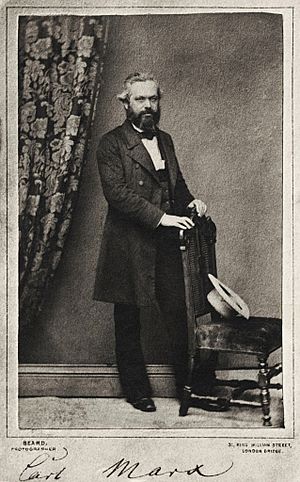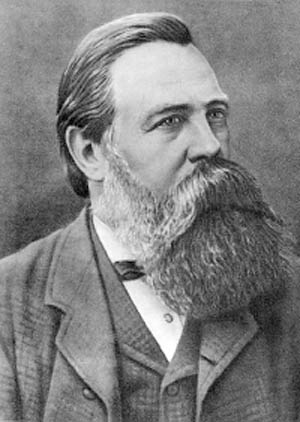Classical Marxism facts for kids
Classical Marxism is a set of ideas about how society, money, and power work. These ideas were developed by two important thinkers, Karl Marx and Friedrich Engels. Their ideas are different from other types of Marxism that came later.
Some of the main ideas in Classical Marxism include:
- Alienation: Feeling disconnected from your work or society.
- Base and superstructure: How the economy (the "base") shapes society's laws, politics, and ideas (the "superstructure").
- Class consciousness: When people in a social class realize they share common interests and problems.
- Class struggle: The ongoing conflict between different social classes.
- Exploitation: When one group unfairly benefits from the work of another.
- Historical materialism: The idea that history is shaped by how people produce things and organize their economy.
- Ideology: The beliefs and values that a society holds, often shaped by the ruling class.
- Revolution: A big, sudden change in how society is organized.
- Means of production: The tools, factories, and land used to make goods.
Contents
Karl Marx

Karl Marx (born May 5, 1818, in Germany – died March 14, 1883, in London) was a very important German philosopher, sociologist, political economist, and revolutionary socialist. He wrote about many topics, like how workers can feel disconnected from their jobs and how the capitalist system works.
Marx is most famous for his idea that history is a story of class struggles. He wrote in The Communist Manifesto: "The history of all society up to now is the history of class struggles." His ideas became very popular, especially after the October Revolution in Russia in 1917. Many parts of the world were influenced by his thoughts in the 20th century.
Some people, like the American scholar Hal Draper, have said that Marx's ideas are often misunderstood by both those who support them and those who don't.
Early Influences
Marx's early ideas were shaped by three main areas: German philosophy, English and Scottish political economy, and French socialism.
German philosophy
Important thinkers who influenced Marx include Immanuel Kant, Georg Wilhelm Friedrich Hegel, and Ludwig Feuerbach.
Marx studied with Bruno Bauer, a student of Hegel. Marx and his friend Engels later disagreed with Bauer and other "Young Hegelians" about socialism. Marx "turned Hegel on his head" by saying that real-world conditions (material things) shape ideas, not the other way around. This idea came from Feuerbach.
Marx's idea of alienation (feeling disconnected) came from Feuerbach's idea that people create God and then feel disconnected from their own human qualities, giving them to God. Marx thought Feuerbach wasn't focused enough on the real, material world.
English and Scottish political economy
Key influences here were Adam Smith and David Ricardo.
Marx studied and criticized the leading economists of his time, who were British. He argued that their economic ideas were specific to capitalism, not universal truths for all societies.
Marx believed that the source of profits in capitalism comes from the value workers create that they are not paid for. He called this "surplus value." Workers sell their "labor power" (their ability to work) for wages. But the capitalists (owners) gain control over the actual "labour" (the work done) and make a profit by paying workers less than the full value their labor adds to a product. This idea of surplus value was a key difference between Marx and earlier economists.
French socialism
Important figures include Jean-Jacques Rousseau, Charles Fourier, Henri de Saint-Simon, Pierre-Joseph Proudhon, and Louis Blanc.
Rousseau was one of the first modern writers to question private property. He is sometimes seen as an early thinker for socialism and communism.
In the 1830s, France faced many social problems because of the Industrial Revolution. Thinkers like Charles Fourier and Saint-Simon proposed big plans for change. Fourier wanted to replace cities with perfect communities. The Saint-Simonians wanted to control the economy by managing money. These ideas, though not widely adopted, helped Marx imagine new ways society could be organized.
Louis Blanc is known for the idea, later used by Marx, about how work and income should be shared: "From each according to his abilities, to each according to his needs."
Pierre-Joseph Proudhon believed in workers helping each other financially to take control of economic relations from capitalists. His book What Is Property? convinced a young Karl Marx that private property should be ended.
Other influences on Marx
Other important influences included Friedrich Engels, ancient Greek materialism, and Giambattista Vico.
Engels' book The Condition of the Working Class in England (1844) helped Marx see history as a struggle between classes. It also made Marx believe that the working class was the most important force for revolution.
Marx was also influenced by ancient thinkers, especially Epicurus, who believed in materialism (that everything is made of matter) and the idea of "clinamen," which suggested a bit of freedom in how things move.
Giambattista Vico had a theory that human societies go through cycles: from simple beginnings to advanced civilization, and then back again. Marx's ideas about historical stages show some influence from Vico.
Friedrich Engels
Friedrich Engels (born November 28, 1820, in Prussia – died August 5, 1895, in London) was a German political philosopher. He helped develop communist theory with his famous partner, Karl Marx.
In 1842, Engels' father sent him to England to help manage a cotton factory. Engels was shocked by the widespread poverty he saw. He wrote about it in his book, The Condition of the Working Class in England in 1844.
Engels lived with Mary Burns, a working-class Irish woman, and later with her sister Lizzie. These women might have introduced him to the Chartist movement, which fought for workers' rights.
Engels also took part in the Revolution of 1848 in Germany, fighting against the Prussians.
Marx and Engels
Marx and Engels first met in person in September 1844. They found they had similar views on philosophy and capitalism. They decided to work together, writing books like The Holy Family.
After Marx was forced to leave France, he and Engels moved to Belgium, which had more freedom of expression. In 1846, they set up the Communist Correspondence Committee.
In 1847, Engels and Marx started writing a short book together. They finished the 12,000-word book in six weeks. It was written to make communism easy to understand for many people. They published it as The Communist Manifesto in February 1848.
Soon after, both Engels and Marx were forced to leave Belgium. They moved to Cologne, Germany, where they started a radical newspaper. By 1849, they both had to leave Germany and moved to London. Even though the Prussian government tried to get them expelled from Britain, the British Prime Minister refused. Marx's family lived in extreme poverty, relying on money Engels could send. Marx and Engels' contributions to Marxist theory are seen as very closely linked.
Main ideas
Here are some of Marx's main ideas, explained simply:
- Alienation: Marx believed that under capitalism, people become disconnected from their work, the products they make, other workers, and even their own human potential. This happens because employers own the products and the profits, not the workers who create them. It's an objective situation, meaning you don't have to feel alienated to be alienated.
- Base and superstructure: Marx and Engels used this idea to explain that the way people produce things (the "economic base" of society) forms the foundation for everything else. On top of this base, a "superstructure" develops, which includes political systems, laws, religion, and ideas. The base shapes the superstructure, but they also influence each other. When the way things are produced changes, it eventually leads to changes in the whole society.
- Class consciousness: This is when a social class becomes aware of its shared interests and its place in society. For example, workers realizing they all face similar challenges from their employers. Marx believed that this awareness is needed for a class to successfully bring about a revolution.
- Exploitation: Marx saw exploitation as a core part of capitalism. He believed that capitalists (owners) make a profit by paying workers less than the full value their labor creates. The difference between the value a worker produces and the wage they receive is the source of the capitalist's profit.
- Historical materialism: This idea, first explained by Marx, looks at how human societies change over time. It suggests that changes happen because of how humans collectively produce what they need to live. It focuses on how economic factors shape social classes, political structures, and ideas.
- Means of production: These are the things workers use to make products. They include tools, machines, factories, and raw materials. The means of production by themselves don't create anything; human labor is needed for production to happen.
- Ideology: Marx used this term to describe the ideas and beliefs that shape how people see social reality. He argued that the ruling class, because it controls the means of production, also controls the main ideas in society. As Marx famously said, "The ideas of the ruling class are in every age the ruling ideas." This can create "false consciousness," where people don't fully understand their own situation or how they are being exploited.
- Mode of production: This is the specific way a society organizes its production. It includes the "productive forces" (like tools, technology, and human labor) and the "relations of production" (like who owns what, how work is organized, and the relationships between social classes).
- Political economy: This term originally meant studying how production was organized in early capitalist countries. For Marx, it meant studying how people organize to produce goods and how the results of that production (like profits or losses) are shared. It specifically looks at capital and how it affects economic activity.
Marx's concept of class
Marx believed that your social class was defined by your relationship to the "mode of production" (how things are made). It wasn't just about how much money you had.
He described several social classes in capitalist societies:
- The proletariat: These are the workers. They sell their ability to work (their "labor power") and don't own the means of production (like factories or land). Marx believed that capitalists exploit the proletariat because workers create more value than they are paid in wages.
- The bourgeoisie: These are the owners. They own the means of production and buy the labor power from the proletariat. They make a profit by exploiting the proletariat.
* The bourgeoisie can be divided into the very rich and the petty bourgeoisie. The petty bourgeoisie are small business owners, farmers, or skilled workers who might employ a few people but also work themselves. Marx thought that most of the petty bourgeoisie would eventually become part of the proletariat as capitalism developed.
- The lumpenproletariat: This group is completely disconnected from the means of production. They are often the very poorest and unemployed.
Marx also saw communists as a separate group. They were educated revolutionaries who would help the proletariat (workers) start a revolution and create a democratic society where the workers ruled. Communists would support any true revolution of the workers against the owners. Their goal was to help create a society without social classes.
Marx's theory of history
Marx's theory of historical materialism says that society is mainly shaped by the material conditions at any given time. This means the relationships people have with each other to meet their basic needs, like getting food and clothes.
Marx and Engels identified five main stages of how these material conditions developed in Western Europe:
- Primitive communism: Early societies where resources were shared.
- Asiatic: A specific type of society, often with a strong central government controlling land.
- Ancient slave society: Societies based on slavery.
- Feudalism: Societies with lords and serfs.
- Modern bourgeois society: Capitalist societies with owners and workers.
See also
- Marxian economics
 | Audre Lorde |
 | John Berry Meachum |
 | Ferdinand Lee Barnett |


